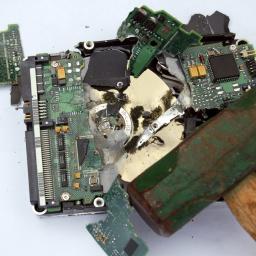Apple has decided to up its game, but is it too late for them and the icloud brand, or is it only the users who will suffer?
The security problems that allowed the celebrity photos to leak was, Apple said,
found between keyboard and chair (not in those words),
iCloud has added extra security features to their popular file storage medium.
The changes come in the wake of the recent leak of a large number of photos from celebrity accounts, allegedly from hacked iCloud accounts. Apple previously released a statement denying any breach within its systems, but admitting that celebrity accounts were compromised by attackers using standard phishing techniques.
Apple may have the technical chops to tighten up security, but it can't (probably) remediate the intrinsic risk in using cloud services, no matter how convenient cloud service may be. Let's see if this changes the public's opinion of cloud backup over all, which has until now been on the rise.
Bell Labs, once dominant innovators in the field of technology has long since fallen from glory. Their old research center, where many of their inventions took shape (including the touch-tone telephone!) has been vacant since 2007.
Now, it looks like the historical building is finding new life.
As far back as the 1930s, the site was a research center for AT&T. The scientists who toiled here were pioneers in developing the transistor, cellphones, touch-tone dialing and fiber optic communications, amassing seven Nobel Prizes.
But since 2007, when the property was closed by Alcatel-Lucent, which had acquired it in a spinoff from AT&T, the structure's fate has been uncertain. At one point, another developer proposed demolishing it, setting off an international outcry from scientists and architects who feared the loss of a piece of intellectual history and an architectural gem.
...The redevelopment plan, which would cost well over $100 million, could transform the former Bell Labs building into a commercial center for Holmdel, a community of about 17,000 people. With no downtown, most of the town's retail properties now sit along busy Route 35.

Nvidia has sued two major technology corporations, Qualcomm and Samsung, claiming it has a 13 year old patent over the GPU itself.
John Hruska of Extreme Tech comments.
There are two reasons why this case sticks out. First, Nvidia, is suing Samsung - a company which does not build its own graphics IP and merely licenses the work of others, including Qualcomm's Adreno, ARM's Mali, and Imagination Technologies' PowerVR. Nvidia's blog post claims that Samsung dismissed these issues as a "supplier problem," ignoring the fact that from Samsung's perspective, that's exactly what this is.
Second, while it's true that this is Nvidia's first patent lawsuit against another company, many of the patents the company is asserting go right back to the beginning of the GPU era. Nvidia is accusing Samsung and Qualcomm, for example, of violating its patent on transform and lighting engines - a patent that dates back to the early days of 3D accelerated games, some 13 years ago. Most of the other patents are nearly as old, and cover equally fundamental aspects of modern GPU programming.

IBM, 1950s inventor of modern hard drives, is said to be working on a
new technology to replace their creation.
Saving files to memory is something that's supposed to be mostly invisible for the end user. We don't need to think about it; it just has to work. But whether it's a solid-state or hard disk drive, conventional storage solutions have their limitations -- namely, speed, rewritability and durability. A team at IBM Research's Almaden facility in California has a cure for all of that and it's called "racetrack memory."
The new technology is said to be far faster than solid state, and far more durable.
New York Times journalist Mike Isaac
comments on the recent release of celebrity naked pictures of terms of what it means for our collective privacy, online security, and rights for websites to police themselves.The images are hardly the first nude celebrity pictures to make their way online. But their publication has touched off a larger discussion on the state of privacy and civil liberties on the Internet. Some privacy advocates are focusing on the role that big tech companies play in policing - or not policing - users who repeatedly push the boundaries of taste, or those who post controversial content like the videos of the beheadings of the journalists James Foley and Steven Sotloff...
...Twitter, YouTube and others may ultimately decide to take a more active approach to policing user-generated content. Twitter has already shown some signs of change. But this is a fine line to tread, as these companies have long trumpeted their democratic approach to unfettered online speech...
...If these services were altered significantly, civil liberties advocates fear it could inhibit how people are able to express themselves online.
[Author note: This is a reminder to take your massive collection of nude selfies off iCloud.]

Remember that guy who had a KickStarter for potato salad? He ended up making $50,000.
John Biggs of Tech Crunch sits down with Zack Danger Brown to
discuss his internet success.So I went to Kickstarter for a day and one of their engineers showed me one of his projects that he posted to get out the message that smaller, not-serious projects can succeed.
He showed me a project that was like a skull t-shirt project, and his video is clearly parody and it's him saying things like "You give $20, you get a skull t-shirt, but if you give $35, you get a sick skull t-shirt!"
He ended up making like $1,000, but the idea was: Look, we are not about big serious projects, you don't have to have an Oculus Rift to succeed on Kickstarter.
[Author note: When Al Gore invented the internet, this is probably not what he had in mind.]

From the department of questionable business decisions
comes Intel's MICA:The MICA, which was engineered by Intel, will be sold at luxury retailer Barneys New York and priced under $1,000, in line with similar jewelry from Opening Ceremony, Intel said. The device will provide alerts and notifications, including SMS messages, calendar reminders, meeting alerts and other notifications sent directly to the wrist display. Also, two-way wireless data communication through a 3G cellular radio will be available without the need to pair with a smartphone. The device can charge wirelessly or using a USB cable. Intel in October plans to provide more details on the bracelet's capabilities.
[Author note: If a chip manufacturer makes jewelry in the market and there are no nerds around to hear, do they make a sound?]
With rumors of Windows debuting Windows 9 at the end of September, pundits everywhere are asking how Microsoft could possibly dig themselves out of the hole they dug with the troubled 'feature set' of Windows 8.
According to Ed Bott of ZDNet, it can be done.We already know a little about what will be in what will probably end up being called Windows 9. Microsoft has officially announced the return of the Start menu, with a new, modern design, as well as the ability of mobile (Metro-style) apps to run in windows on the Windows desktop. More recent rumors suggest that virtual desktops will be added and Windows 8's signature charms menu will vanish. Cortana might even make an appearance.
[A] metaphor for this release might be the crack of a starter's pistol, marking the beginning of a new stage in a very long race. What gets delivered this fall as a preview will be updated in a few months as a final release, which will then be revised and expanded again and again over the next few years as Microsoft's new, faster update cadence continues.
Hey, if this version's good enough maybe I'll stop using Windows 95.
John McAfee, eccentric security pioneer turned Belize wanted criminal, made an appearance at Defcon22 to unveil his latest creation,
The Brown List.
Tech Times writes:
John McAfee announced The Brown List in a surprise appearance in Las Vegas at the Defcon, the largest gathering of computer hackers in the world. While the site sounds like it's just a magnet for rants, McAfee looks at it differently. "This taps into anger in a positive way. Instead of getting angry and shooting at somebody on the highway, or yelling at your wife, you can log onto the site. Instead of just lashing out, give us your positive solutions
Over the past few months I've been successively spending more and more time working on developing a computer game. Now, it was hardly noticeable at the beginning, but as time has gone on, I've been having more and more trouble remembering things. Sometimes it's in my every day life, like, I forget where I'm going, but more often than not, I'll be working, and I'll switch between two files, and then completely forget why I did or what I'm doing in the new file.
Has anyone had this problem? Or do I just have a case of programmer's-island-fever?



